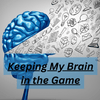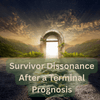What I Wish I Knew 625 Days Ago

Six hundred and twenty-five days ago, I heard the words that changed everything. Glioblastoma.
At that moment, it felt like the world slammed on its brakes, but my mind hit the gas. I went into overdrive. My brain was racing, my body was numb, and everything around me felt both loud and silent at the same time. I remember nodding while the doctor talked, pretending I was absorbing it all, but inside I was screaming: What now?
If I could sit down with the version of me from that day, I would grab him by the shoulders and say, “Slow down.”
But I did not slow down. Not even close.
The Urge to Move Faster
I wish I knew that the first few weeks and months after a diagnosis are not a race. Back then, I thought I had to make every decision instantly — about treatment, about work, about my personal life. I told myself that the clock was ticking and that standing still was dangerous.
What I did not understand is that the clock was already ticking whether I moved fast or not. And in moving so quickly, I burned myself out mentally and emotionally before I had even processed what was happening.
I made choices about my career during chemo and radiation, at a time when my body and mind were in survival mode. That was not the version of me who should have been making life-changing decisions. That was the version of me who should have been resting, healing, and letting the dust settle before trying to rebuild.
Irrational Choices From a Shaken Mind
Mental health is a tricky thing after a diagnosis like this. You do not just deal with the physical reality of the illness, you deal with the constant hum of anxiety in the background. I was already prone to overthinking before this, but after the diagnosis, my mind became a minefield.
That is how I ended up making some choices that, looking back, were irrational. I rushed into certain changes thinking they would make me feel more in control. I made big, permanent moves based on temporary emotions.
The truth is, I was reacting to fear, not making plans from clarity. I wanted to feel like I was doing something, anything, to fight back against this thing in my head. But sometimes, the best move would have been to sit still, breathe, and wait for the fog to clear.
Optune — What I Wish I Researched More
One of my biggest regrets is not taking more time to understand the reality of wearing Optune before committing. I went into it knowing the basic medical facts but not the mental, emotional, and physical toll it would take on me.
I wish I had talked to more patients who had worn it. I wish I had been honest with myself about how it might affect my mental health, my social life, and my comfort day-to-day.
Optune is a tool, and for some people it is absolutely worth it. But for me, it became something I resented, something I felt chained to. And because I rushed into it, I felt like I had no room to change my mind without feeling like I had failed myself.
The One Thing I Would Never Change
If there is one thing I would never undo about this journey, it is how close it has brought me to my husband, my family, and even to the work I do in outreach.
Before my diagnosis, life was busy in that constant, noisy way where you think you are connected but you are actually just moving alongside each other. We talked, we shared space, we said “I love you” — but we were caught up in the day-to-day grind.
This disease stripped a lot away. It took energy, it took plans, it took a sense of certainty. But what it gave me in return was the clearest, deepest connection I have ever had with the people who matter most to me.
My husband and I have had conversations we might never have had otherwise — raw, honest, sometimes messy talks about fear, hope, and the reality of what we are facing. There is a kind of intimacy that comes from sitting in the hardest moments together and still choosing each other every single day.
With my family, I have felt their love in ways that go beyond words. It is in the rides to appointments, the meals dropped off, the check-ins that do not ask for updates but just say, “I am here.” These moments have reminded me that even in a life that feels unpredictable, some things are steady.
And my outreach — connecting with others who are walking a similar path — has given me purpose. It has pulled me out of my own head and into conversations that matter. I have seen firsthand how simply listening, sharing my story, or offering a bit of encouragement can ripple outward in ways I never imagined.
If you asked me if I would take back this disease, I would say yes without hesitation. But if you asked me if I would give up the closeness it has created, the walls it has broken down between me and the people I love, the truth is… I would not trade that for anything.
The Pressure to “Make the Most of It”
Another thing I wish I knew? That I did not have to transform my entire life in the first year after diagnosis. I had this pressure in my head — maybe from myself, maybe from the way people talk about cancer — that I had to live harder, take risks, make big changes.
The problem is, when you try to reinvent your life while you are in the middle of treatments that are literally designed to knock you down, you are building on shaky ground. You do not have a stable foundation yet.
I wish I had allowed myself to keep things the same for a while. To hold on to routines, to stay connected to parts of my old life instead of throwing myself into the unknown. Because change is hard enough without the exhaustion, nausea, and mental fog of chemo and radiation riding shotgun.
Isolation and Mental Health Go Hand in Hand
There is this thing no one warns you about: isolation changes your brain. It can make you suspicious of people’s intentions, hyper-aware of the times they do not reach out, and weirdly blind to the times they do.
When you are alone with your thoughts too much, you start spinning stories that are not always true — stories about being forgotten, about not mattering, about being “too much” for people to handle. And the more you believe those stories, the easier it is to make decisions that push people even further away.
I wish I had recognized that sooner. I wish I had reached out instead of retreating. I wish I had asked for help, not just with the big things, but with the simple human need for connection.
If I Could Go Back
If I could go back to 625 days ago, here is what I would tell myself:
-
Take your time. There is no award for making every decision in the first month.
-
Do not make permanent choices in temporary storms. Wait until you feel steady before you change big parts of your life.
-
Ask more questions. Especially about treatments like Optune. Talk to people who have lived it, not just the ones who recommend it.
-
Stay connected. Even when you feel like hiding, answer the call, send the text. Isolation will not protect you; it will just hurt you more.
-
You do not have to reinvent everything right now. Keep some of your old life as an anchor while you navigate the new one.
Where I Am Now
I am still learning. I still have days where I feel alone, days where the weight of this diagnosis makes my chest heavy. But I am also more aware now of how much mental health matters in this fight.
Glioblastoma is not just a battle in your body — it is a battle in your mind. And if you do not take care of that part, the rest becomes even harder.
I wish I had known that 625 days ago. Maybe I would have been gentler with myself. Maybe I would have made fewer rash choices. Maybe I would have realized sooner that slowing down does not mean giving up — it means giving yourself a chance to survive more than just the disease.


 NEW ARRIVALS
NEW ARRIVALS APPAREL
APPAREL GIFT AND HOME
GIFT AND HOME COLLECTION'S
COLLECTION'S HOPE HUB
HOPE HUB BLOG
BLOG




Thank you, John! I think you’ve done well. When you get a diagnosis Glio and it’s always stage four you have to take action. You made good decisions based on treatments available…so much in such a short time. I’m glad you did the Optune.
Lots of pressure but also some amazing professionals. Hope you remain clear and no evidence of spreading. You’re amazing.
You make me smile.🤩 ❤️🙏
I loved this update mi Amor. I agree it’s been a very humbling and heart opening experience. This journey that you’re on this chapter of your life may not be what people would focus on or even want for themselves or anybody else but you have shown courage you’re brave you’re strong and it makes me fall in love with you even more thank you for being my husband. I will always be by your side, Te Amo.